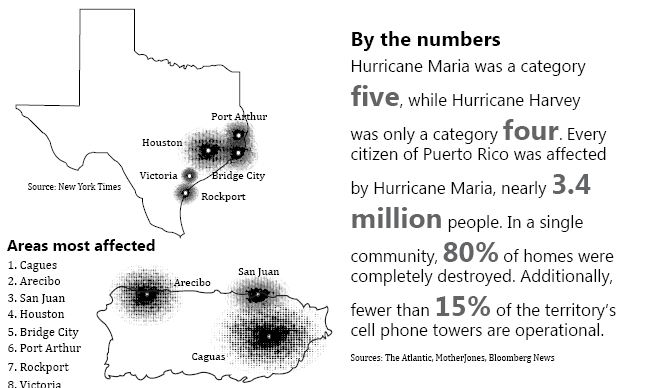Puerto Rico not receiving enough aid
More stories from Payton Fenwick
On Aug. 25, Hurricane Harvey touched base on the Texas Gulf Coast and devastated many American homes and lives. Nearly a month later, on Sept. 20, Hurricane Maria made direct landfall on the Puerto Rican coast. Puerto Rico does not have the same level of sophistication in their anti-flooding techniques and sewage lines as Texas. Consequently, the devastation in Puerto Rico has been reported as “apocalyptic.” Texas should not be receiving preferential treatment just because of its proximity while U.S. citizens are suffering in Puerto Rico.
Fifty-five percent of the citizens in Puerto Rico still do not have drinking water. The U.S. territory, Puerto Rico, is underdeveloped compared to the states. Texas will easily be able to bounce back due to their technological advancements. It will still be difficult because of the many homes, businesses and lives being destroyed, but residents there have more support to begin with.
However, in Puerto Rico, infrastructures were not as sophisticated before the hurricane and because of this, it left Puerto Rico with basically no infrastructure to build from. Texas may still deserve supplies from the Federal Emergency Management Agency (FEMA), but Puerto Rico should earn the same amount of supplies, if not more, as Texas.
About three and a half million U.S. citizens reside in Puerto Rico and are entitled to the same government response as any other state. Just because Texas is not in the middle of what President Trump said “is a very big ocean” does not mean it is the only disaster that should be a priority to U.S. citizens.
Puerto Rico has received very little aid compared to aid that Texas has, and still is, receiving. People are dying in Puerto Rico while President Trump is insulting the mayor of San Juan for not being “complimentary” to him.
Not only is the United States administration not helping as much as they should be, but the residents that live in America as well are not doing their part. This is not just a natural disaster, this is an “apocalyptic” humanitarian disaster. John Mutter, a Columbia University professor who specializes in natural disasters, believes that the death toll could reach into the hundreds if the conditions such as the lack of clean water, hardly any working air conditioners and basically no power, continue to get worse. Sixteen people died originally as a result of the storm itself.
The people who live in Puerto Rico are left without homes, jobs or roads to travel on and the U.S. is focusing on the devastation in Texas alone. It is the government’s responsibility to treat this natural disaster with the same care and support as the natural disaster that has occurred on their home front.

